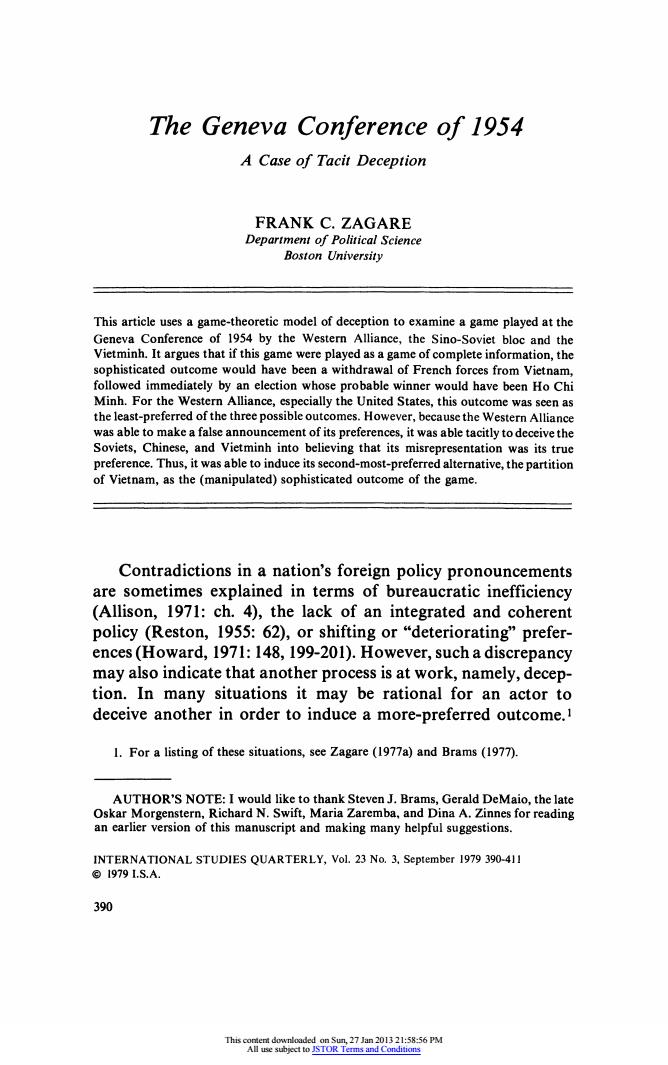正在加载图片...

The Geneva Conference of 1954 A Case of Tacit Deception FRANK C.ZAGARE Department of Political Science Boston University This article uses a game-theoretic model of deception to examine a game played at the Geneva Conference of 1954 by the Western Alliance,the Sino-Soviet bloc and the Vietminh.It argues that if this game were played as a game of complete information,the sophisticated outcome would have been a withdrawal of French forces from Vietnam, followed immediately by an election whose probable winner would have been Ho Chi Minh.For the Western Alliance,especially the United States,this outcome was seen as the least-preferred of the three possible outcomes.However,because the Western Alliance was able to make a false announcement of its preferences,it was able tacitly to deceive the Soviets,Chinese,and Vietminh into believing that its misrepresentation was its true preference.Thus,it was able to induce its second-most-preferred alternative,the partition of Vietnam,as the (manipulated)sophisticated outcome of the game. Contradictions in a nation's foreign policy pronouncements are sometimes explained in terms of bureaucratic inefficiency (Allison,1971:ch.4),the lack of an integrated and coherent policy (Reston,1955:62),or shifting or "deteriorating"prefer- ences(Howard,1971:148,199-201).However,such a discrepancy may also indicate that another process is at work,namely,decep- tion.In many situations it may be rational for an actor to deceive another in order to induce a more-preferred outcome.1 1.For a listing of these situations,see Zagare(1977a)and Brams(1977). AUTHOR'S NOTE:I would like to thank Steven J.Brams,Gerald DeMaio,the late Oskar Morgenstern,Richard N.Swift,Maria Zaremba,and Dina A.Zinnes for reading an earlier version of this manuscript and making many helpful suggestions. INTERNATIONAL STUDIES QUARTERLY,Vol.23 No.3,September 1979 390-411 ©1979L.S.A. 390 ThPM ns and ConditionsThe Geneva Conference of 1954 A Case of Tacit Deception FRANK C. ZAGARE Department of Political Science Boston University This article uses a game-theoretic model of deception to examine a game played at the Geneva Conference of 1954 by the Western Alliance, the Sino-Soviet bloc and the Vietminh. It argues that if this game were played as a game of complete information, the sophisticated outcome would have been a withdrawal of French forces from Vietnam, followed immediately by an election whose probable winner would have been Ho Chi Minh. For the Western Alliance, especially the United States, this outcome was seen as the least-preferred of the three possible outcomes. However, because the Western Alliance was able to make a false announcement of its preferences, itwas able tacitly to deceive the Soviets, Chinese, and Vietminh into believing that its misrepresentation was its true preference. Thus, it was able to induce its second-most-preferred alternative, the partition of Vietnam, as the (manipulated) sophisticated outcome of the game. Contradictions in a nation's foreign policy pronouncements are sometimes explained in terms of bureaucratic inefficiency (Allison, 1971: ch. 4), the lack of an integrated and coherent policy (Reston, 1955: 62), or shifting or "deteriorating" preferences (Howard, 1971: 148, 199-201). However, such a discrepancy may also indicate that another process is at work, namely, deception. In many situations it may be rational for an actor to deceive another in order to induce a more-preferred outcome.' 1. For a listing of these situations, see Zagare (1977a) and Brams (1977). AUTHOR'S NOTE: I would like to thank Steven J. Brams, Gerald DeMaio, the late Oskar Morgenstern, Richard N. Swift, Maria Zaremba, and Dina A. Zinnes for reading an earlier version of this manuscript and making many helpful suggestions. INTERNATIONAL STUDIES QUARTERLY, Vol. 23 No. 3, September 1979 390-411 o 1979 ISA. 390 This content downloaded on Sun, 27 Jan 2013 21:58:56 PM All use subject to JSTOR Terms and Conditions